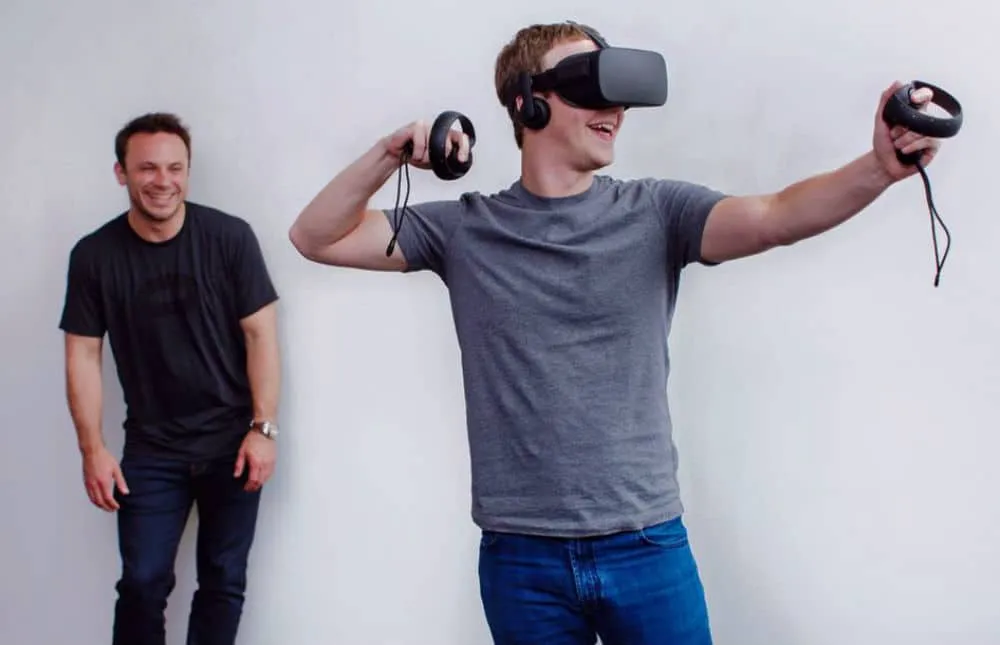Oculus is not a company anymore.
Over the past three years what began as one of the tech world’s youngest and most exciting startups has been steadily folded into the irresistible mass of of its parent company, Facebook. The recent, high-profile departure of Palmer Luckey — Oculus co-founder and inventor of its primary Rift VR technology — was the final step in a long process of assimilation. Oculus is no longer a company, it’s a team inside of a massive corporation. This is how it happened.
March 2014 – Buyout
Following a massively successful Kickstarter campaign that put virtual reality back on the radar of many, it was announced on March 25, 2014 that Facebook would be acquiring the company for $2.4 billion (a figure that may be as high as $3 billion with additional payouts). The news broke with a mixture of outrage and excitement from concerned early adopters as the debate began on whether this would be good for VR’s future.
From that day forward Oculus was part of the Facebook family. Competitors and allies would soon rise from Samsung, Sony, HTC and others. But in many ways the golden age of modern VR began on the day of this acquisition.
September 2016 – Luckey Breaks
Palmer Luckey was the face, voice and heart of Facebook’s new purchase up until September of last year. He spoke at events, appeared for photo ops or interviews, graced the cover of TIME Magazine and even hand delivered the first consumer Oculus Rift live and on camera. He was, in many ways, a living embodiment of the hacker-in-a-garage energy that modern VR’s early momentum fed upon so hungrily. As long as Luckey was still the one appearing, speaking and delivering, Oculus still felt like a semi-independent organization being steered by its initial founders. However, that all changed when Luckey disappeared.
Following a report that he used personal funds to fund anti-Clinton billboards, Luckey posted an apology to his Facebook page, linked to it from his Twitter profile and has not used either account since. For months he was a ghost, even failing to appear at his company’s annual developer conference: Oculus Connect 3. Luckey was a mainstay of the Oculus Connect keynotes, but in 2016 his space was occupied by Facebook CEO Mark Zuckerberg.
Since the acquisition, the lines that allowed Oculus to still be considered somewhat independent were based primarily on perception and presentation. When Zuckerberg stepped onto that stage at OC3 those lines became blurrier than ever. For the first time it seemed like Oculus may not be its own company under a large umbrella, but may actually be a piece of the umbrella itself.
October 2016 – “From Facebook”

From that point forward, many official appearances of the Oculus logo at CES, GDC, on advertisements, etc. have the words “from Facebook,” just below it. With just two words, Facebook began claiming Oculus as its own while simultaneously presenting itself as the primary source of whatever technology or innovation it may produce. The optics and messaging were evolving fast in Luckey’s absence and those blurred lines were quickly becoming all but invisible.
December 2016 – Reshuffle
Luckey may have retreated from the public eye but, in reality, he was always more of a symbolic leader for the company. It’s official head and CEO was Brendan Iribe — the Scaleform founder who, along with fellow co-founder Nate Mitchell and other friends, helped transform the Rift from a mass of duct tape into a bona-fide product. As long as Iribe held the title of CEO Oculus still seemed like a subsidiary of Facebook rather than a piece of it. Assimilated companies don’t have their own CEO, but they do have vice presidents. Enter Hugo Barra.
On December 16, 2016 Facebook announced that Iribe would be stepping down as CEO. The Oculus organizational structure would be reshuffled into PC and mobile VR teams with Iribe heading up a research team focused on PC VR. For a month the VR world wondered who would replace Iribe as the CEO of Oculus. Then in January we got our answer: nobody.
January 2017 – Mr. Vice President
On January 25, 2017 Zuckerberg appointed Hugo Barra, a VP at Xiaomi at the time, as Facebook’s new VP of VR. According to Zuckerberg, in this role he would, “lead all of our virtual reality efforts, including our Oculus team.”
There it was in plain English. Oculus was no longer an acquired company operating with relative independence under its own CEO and co-founders. It was now a “team” within its parent company reporting to an appointed VP.
The reshuffling of Iribe and the hiring of Barra made it official: Oculus should now be considered a division within Facebook not a semi-separated entity.
Today – Welcome to The Team
Today: Palmer Luckey has officially left Oculus. It is unclear the reasons for the departure but what we do know is that Barra’s first official day on the job was immediately after Luckey’s last. Whether intentional or not, that bit of timing is symbolic of the transformation that Oculus has been going through since 2014.
Facebook utilized a very similar process of absorption when it acquired Instagram in 2012. In fact, Facebook has acquired or merged with 61 companies since it was founded in 2004. Most of those had their names discarded and their technology assimilated altogether. For now, however, Facebook is keeping the Oculus name alive.
That name is the last true differentiating factor between the Oculus team and Facebook’s general VR team. For now, the name Oculus communicates a brand and a product that is valuable enough for Facebook to keep but who knows if that will remain the case into the future.
The lines that once created the illusion of independence have been wiped away. Facebook is the company now and Oculus is just one more member of its expansive ecosystem.































